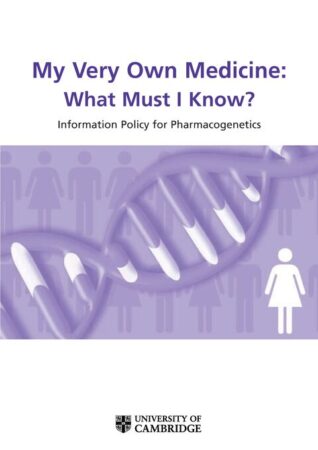Home Publications Reports Pharmacogenetics: my very own medicine
Pharmacogenetics: my very own medicine
Information policy for pharmacogenetics
In the second half of the 20th century, enormous strides were made in the development of effective pharmaceuticals, resulting in many lives being saved. On the whole, this progress has been achieved by focusing on large groups of patients with precisely defined diseases. This strategy ensured that drugs were relatively safe for the group, even if they were not always effective in every patient. It is clear that large individual differences exist in response to drugs, due to a variety of factors. The term ‘pharmacogenetics’ (‘PGx’) is used in this report to cover the study of genetically-determined variability in response to drugs. The report also discusses the resulting clinical applications or ‘products’, all of which involve genetic testing of individual patients. Genetic tests may be used to help:
- Choose the most appropriate drug for each individual
- Select an optimal dose for each individual
- Identify those at risk from atypical adverse drug reactions
Recent advances in molecular genetics and the falling costs of genetic testing have lent momentum to this field of research. In theory, genetic testing can have several advantages over more traditional therapeutic drug monitoring, because it can be undertaken before treatment begins; may be easily and inexpensively performed (with, for example, buccal swab samples); can be predictive for multiple drugs substrates rather than a single drug; and the relevant genetic markers are constant over an individual’s lifetime. In the optimistic days of the race to map the human genome, a number of influential proponents argued that pharmacogenetics would revolutionise drug marketing and prescribing. Instead of hoping for the best, a simple and decisive gene test would indicate to the doctor which drug would be optimal for the specific patient sitting in front of her. Large pharmaceutical companies could also exploit pharmacogenetics as a tool to accelerate drug development, because patients who could not benefit or might be at risk could be removed from trials, and clearer results could be obtained.
By Philippa Brice

